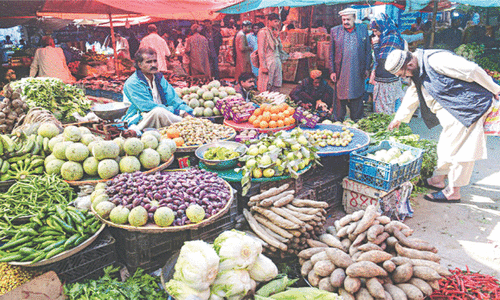THE President of the World Bank, Paul Wolfowitz, following his first visit to Pakistan says this country loses four to six per cent of its GDP annually due to poor infrastructure, regulatory obstacles and informal barriers. Speaking before the National Press Club in Washington DC, he said that the Lahore-Karachi corridor, which links Pakistan’s major ports in the south with the major cities in the north, is the country’s lifeline. Ports, railways and roadways along this corridor handle 95 per cent of Pakistan’s external trade.
But poor services and road conditions are doubling travel time. Cost of transport, insurance and related services are 3-4 times higher than in Europe. Long and cumbersome customs procedures have encouraged bribery, he said.
The president added that many businesses in Lahore produce goods that are competitive in the global economy, but by the time these goods reach ports in Karachi, their competitiveness will have declined dramatically.
He said one third of the increased cost is due to poor infrastructure and two thirds is due to regulatory obstacles and informal barriers. Problems like these are costing Pakistan’s economy dearly, perhaps as much as 4-6 per cent of the GDP.
He said the bank is working with the government of Pakistan to develop projects and policies for infrastructure, pricing and regulation and strengthening institutions that will significantly reduce the time and cost of moving goods through this corridor.
Mr Wolfowitz has understated the total loss, which is varied and vast on account of the factors he has mentioned to avoid any controversy.
The loss to the economy from the large number of holidays and holy days is very large and sudden holidays hit the production hard and hold up exports. The number of holidays seems to be increasing even under military rule, which claims to give importance to productivity and progress.
The loss to the economy as a result of frequent load-shedding of electricity and even more a breakdown of electricity services is very large. Now industries are being allowed to produce their own power, but not everyone has the requisite capital nor the additional space needed to set up generational plants.
Shortage of water and irregular supply hurt the textile industry and others, which depend on a great deal of water. That may be attributed to the underdeveloped infrastructure.
Corruption plays a large part in increasing the cost of production and in slowing down the productive process.
Red tape aggravates the problem further in an effort to extract money from the producers and slows down production even more. Too many official papers with quite a few stamps are required at every stage in the industry. At each stage the palms of the lower officials have to be greased.
Industrialists in Karachi have been protesting against having to deal with about 40 official agencies — federal, provincial and local — and each may be involved in an element of corruption.
The numbers of taxes, too, were until recently about 101 (federal, provincial and local) but they have come down to an extent, because of the efforts of Prime Minister Shaukat Aziz to appease the industrialists.
Starting a new project, particularly with foreign investment, has a variety of hassles. Getting enough land is tough as it is while land has become quite costly as well, though the government has came up with special measures to provide land at reasonable costs. Stamp duty in Karachi and Sindh is also very high.
The foreign investors are disheartened by the slow moving judicial process. They are not able to get decrees executed or judgments enforced and that is too exasperating for many investors who have been taken to court. They have been protesting against the slow judicial process very strongly and the government admits to this serious drawback, and is moving slowly to remedy the situation.
The waste in the agricultural sector is very high as poor seeds often produce low crops. Post-harvest losses of grains — even in 1960 — were estimated at 20 per cent. Rodents get a large share of such grains. Many fruit growers set up cold storage plants, but when the electricity fails for long periods the fruits rot and go to waste. A classic case of waste in the cotton sector is the manner with which Pakistani cotton has been getting six to 10 percent less in the New York cotton market. Various attempts have been made to produce dust-free and pest-free cotton.
As commerce minister, Razzaq Dawood tried hard to produce pest-free and dust-free cotton and had almost succeeded, but following his exit, the problems surfaced again.
And yet the support price for lint cotton has been raised now to Rs2,279 from Rs2,159. And the world cotton prices are higher than that.
The sugar industry loses money by not opting to make by-products, including industrial alcohol. They can sell sugar cheaper if they produce some of the by-products of sugar, including ethanol, as a substitute for petrol.
While the manufacturers lose their competitive edge abroad, they raise the prices at home as they have done in respect of sugar by about Rs5 a kilo and the domestic consumers suffer. The only solution is to get more organized and resist their exploitation, whether it be by cement manufacturers, who have announced a small discount in prices, or by the sugar manufacturers or the government, which keeps on announcing higher support prices for wheat from time to time.













































Dear visitor, the comments section is undergoing an overhaul and will return soon.